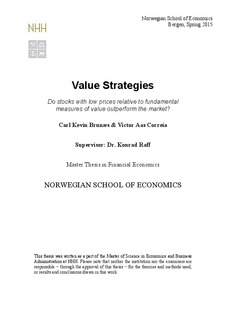| dc.description.abstract | This paper investigates weak-form market efficiency of the U.S. equity market by
identifying market anomalies related to value strategies for portfolios formed on
price-earnings, price-dividends, price-cash flow and five-year past sales rank. Value
strategies are investment strategies based on buying stocks that have low prices
relative to measures of value for the firms, such as earnings and dividends. We apply
three asset pricing models to measure the performance of the strategies. The
explanatory power of the models are evaluated and compared across subperiods. Our
results indicate that three out of four value strategies outperform the market and that
the more sophisticated asset pricing models capture variability in monthly stock
returns to a greater extent. Furthermore, we show that the explanatory power of these
models varies over time. | nb_NO |
